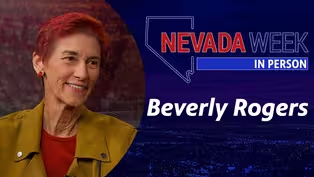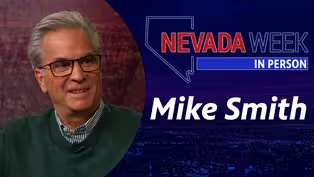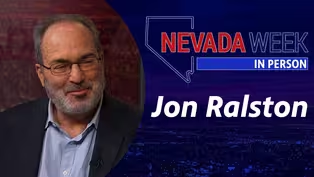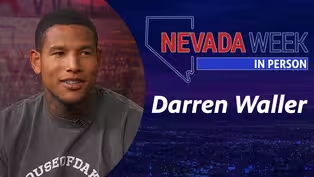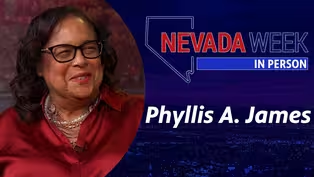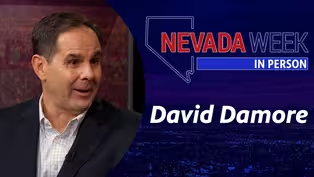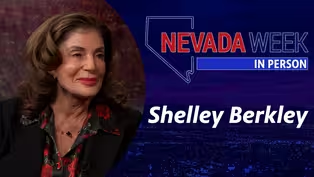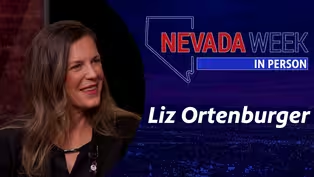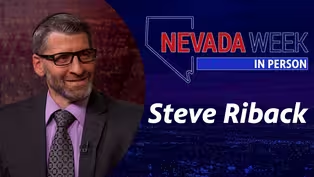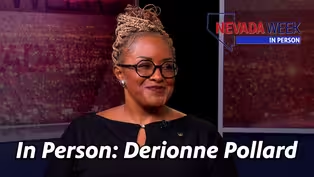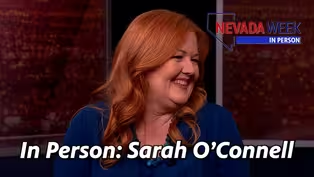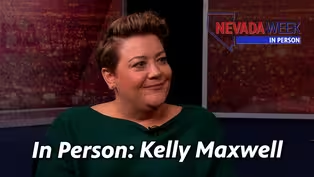
Nevada Week In Person | Shani Coleman
Season 1 Episode 31 | 14mVideo has Closed Captions
One-on one interview with Shani Coleman.
One-on one interview with Shani Coleman.
Problems playing video? | Closed Captioning Feedback
Problems playing video? | Closed Captioning Feedback
Nevada Week In Person is a local public television program presented by Vegas PBS

Nevada Week In Person | Shani Coleman
Season 1 Episode 31 | 14mVideo has Closed Captions
One-on one interview with Shani Coleman.
Problems playing video? | Closed Captioning Feedback
How to Watch Nevada Week In Person
Nevada Week In Person is available to stream on pbs.org and the free PBS App, available on iPhone, Apple TV, Android TV, Android smartphones, Amazon Fire TV, Amazon Fire Tablet, Roku, Samsung Smart TV, and Vizio.
Providing Support for PBS.org
Learn Moreabout PBS online sponsorshipMore from This Collection
Nevada Week In Person goes beyond the roundtable discussion of Nevada Week with guests for a more casual conversation about their personal passions, new projects and compelling stories that are overlooked in the flurry of the news cycle.
Nevada Week In Person | Beverly Rogers
Video has Closed Captions
One-on-one interview with Rogers Foundation chair Beverly Rogers. (14m)
Nevada Week In Person | Mike Smith
Video has Closed Captions
One-on-one interview with Las Vegas Sun political cartoonist Mike Smith. (14m)
Nevada Week In Person | Jon Ralston
Video has Closed Captions
One-on-one interview with The Nevada Independent CEO Jon Ralston. (14m)
Nevada Week In Person | Darren Waller
Video has Closed Captions
One-on-one interview with Las Vegas Raider tight end Darren Waller. (14m)
Nevada Week In Person | Phyllis A. James
Video has Closed Captions
One-on-one interview Phyllis A. James. (14m)
Nevada Week In Person | David Damore
Video has Closed Captions
One-on-one interview with Chair of the Department of Political Science at UNLV David Damor (14m)
Nevada Week In Person | Shelley Berkley
Video has Closed Captions
One-on-one interview Senior Vice President for Touro University Shelley Berkley. (14m)
Nevada Week In Person | Liz Ortenburger
Video has Closed Captions
One-on-one interview with SafeNest CEO Liz Ortenburger. (14m)
Nevada Week In Person | Steve Riback
Video has Closed Captions
One-on-one interview with Las Vegas Metro Police Lieutenant Steve Riback. (14m)
Nevada Week In Person | DeRionne Pollard
Video has Closed Captions
One-on-one interview Nevada State College President DeRionne Pollard. (14m)
Nevada Week In Person | Sarah O’Connell
Video has Closed Captions
One-on-one interview with Director of Eat More Art LLC Sarah O’Connell. (14m)
Nevada Week In Person | Kelly Maxwell
Video has Closed Captions
One-on-one interview with Baby’s Bounty Executive Director Kelly Maxwell. (14m)
Providing Support for PBS.org
Learn Moreabout PBS online sponsorshipFor years diversifying Southern Nevada's economy has been the goal of several community leaders, and the woman in charge of that effort for Clark County is Shani Coleman, and she's our guest this week on Nevada Week In Person.
♪♪♪ Support for Nevada Week In Person is provided by Senator William H. Hernstadt and additional supporting sponsors.
Welcome to Nevada Week In Person; I'm Amber Renee Dixon.
Las Vegas is known for its casinos and conventions.
It's a tourist destination that attracts people from all over the world.
But when a pandemic or recession hits, the local economy takes a big hit as well, which is why some would argue Southern Nevada needs a more varied business base.
in Clark County, Shani Coleman is leading efforts on that front.
Shani, thank you so much for joining us.
-Thank you for having me.
I'm excited to be here today.
-You are a Las Vegas native.
We love when we have Las Vegas natives in.
You give a broader, more historical perspective.
And I am wondering how different is Southern Nevada's economy now, compared to when you were growing up?
(Shani Coleman) Wow.
You know, we've grown, right?
We're what I like to call a big city now, right?
We have all of the wonderful things that you see in large metropolitan areas, great restaurants and great shopping, my favorite thing, but without some of the challenges you have in large metropolitan areas.
I like to tell the story.
You know, my mother is originally from New York, and I used to spend all of my summers in New York.
One of the great things about going back and forth between the two cities is, you know, back when I was growing up, New York had everything.
So I would go there for the summer, and I would buy all this stuff and come back to Vegas and everybody would be like wow, but now I don't have to do that anymore, right?
Like we have all of those amenities here and so, you know, even our casinos have grown up, you know, the things that we offer to tourists.
So look, we have an adult economy, right, not just in the sense of some of the entertainment that we offer as far as gambling, but you know, we've grown up.
We're a traditional city.
Sports happening, right?
That was kind of like the last shoe to drop, and we've made a significant impact in the sports community.
And that's had a great impact on our economy.
-At the same time, your job is to convince businesses from other states to possibly relocate here.
And it also serves Southern Nevada's economy at the same time-- well, at least that would be I guess my opinion as we talked about.
If there's a recession or a pandemic, the local economy takes a hit because there's not a ton of different businesses.
What is your take on that?
Am I in the right direction or no?
-Um, yes.
So I think there's two things that need to happen.
We need to make sure that we support our main economy which is hospitality, tourism.
These are important to us.
They provide lots of jobs.
But there's also an opportunity which we're seeing right now, to go beyond hospitality and tourism.
Do I ever think hospitality and tourism will not be the main economy of Las Vegas?
No.
But there are ways that we can support that and supplement that.
And technology is a great example of this, right?
I believe that some of the technology that's available globally today actually has the ability to support our largest industry, but also itself become its own industry.
You know, a great example of this is UNLV has started Harry Reid Technology Park, and in there they have Black Fire Innovation, which is a collaboration with Caesars Entertainment, really looking at okay, how do we utilize technology to enhance our hospitality and tourism industry.
But you need people to actually do this technology, so you're getting the best of both worlds, right?
You're getting this really elevated experience when people come to visit Las Vegas, but you're also supporting an economy that is different than the tourism and hospitality industry.
-What kind of businesses have been reaching out to you, and what are their questions about Clark County, Las Vegas?
-We get a lot of California, a lot of California people.
I get two to three calls a week from businesses from California that, you know, are just looking for a different experience for their business.
They're looking for a more business friendly environment.
You know as a state we don't have income tax here, and so businesses and people living here get the benefit from that.
But also we have a very, I say, a very relaxed environment in the sense that you can reach out and you can talk to your elected officials, right?
You have questions, and this is important, right, being able to easily navigate the business network and the regulatory community so that way you can operate your business the way that works for you, right, not being bogged down and red tape.
And so that's something we believe is very important.
And I think something that we do very well.
-You're accessible-- permitting, licensing.
You had a similar role with the City of Las Vegas.
How different is your role now with Clark County?
-Oh, scope.
-Yeah.
-Scope.
So Clark County by population, we are the 13th largest county in the United States.
But by land size, we are the 22nd largest.
So when you think about that, Clark County has both very urban areas, but we also have rural communities.
And in my role, I need to work with those equally, right?
So we have communities down in Laughlin that have an economy based on the Colorado River and outdoor activities related to that, but I also have things in the urban core around Maryland Parkway, Boulevard Mall that are also important as well.
So just the sheer scope of the things that I'm responsible for and the things that I have to look at has increased dramatically.
-What was that like, learning about the rural areas and their needs?
-You know, it's very interesting.
They're very different.
A lot of them love that small town feel that they have, and so we always have to be careful that, you know, any type of economic development we do doesn't try or attempt to change the feel of that, right?
So unlike being in the middle of town here in the Las Vegas Valley, you know, in Laughlin that's a different look and feel, and we need to be cognizant of that.
-All right.
And then you talked about areas around Boulevard Mall which has had plenty of development that people, businesses coming and going.
What are your ideas for an area like that?
What can people perhaps expect?
-One of the great things that the County Commission did is that they reestablished the Clark County Redevelopment Agency.
It had not been operating for a number of years, and so this creates an opportunity of a specialized funding source that allows us to look at redevelopment in a different way.
Those areas traditionally when you think about them, those were originally our suburbs.
Our city has grown up around that and grown out from that.
So those are inner city, mature neighborhoods, and they need to be treated as such.
And so we think with the Redevelopment Agency, there's going to be some opportunities.
There's a redevelopment area directly across from the Boulevard Mall, and there's an area around Maryland Parkway and Sahara.
So we think that the Redevelopment Agency is going to create some opportunities for some reinvestment in those areas.
-All right, to revitalize that area.
-Exactly.
-You know, maybe make some of the people that are living in that area a little bit happier as well.
-Happier, yeah, but really taking a look at again, back to big cities, right?
And what you see instead of sprawling out but looking at things like walkability, looking at things like public transportation.
One of the things that we worked on with the Regional Transportation Commission is the Maryland Parkway transit-oriented development where you actually look at how do we create neighborhoods where people can get around easily, right?
So maybe they walk to work or housing is close by, things that they utilize as far as like retail and shopping are close by.
And so really want to look at that area and figuring out okay, how do we densify that; how do we create a better quality of life and living experience, not just jobs but the whole thing?
-Bringing it all together.
You played a crucial role in creating Clark County's first standalone Economic Development Department, and it makes sense to me for the reasons we've spoken about, but why didn't it exist earlier?
-You know, I can't really speak to it.
I think there was kind of a thought that we have the Strip.
That's in unincorporated Clark County; that's Clark County's jurisdiction.
And so things were just kind of clicking along-- -On their own.
-Yeah.
Things were kind of clicking along because of what was going on on the Strip, but I think some of the newer commissioners had a thought like, there's more to Las Vegas than the Strip, right?
There's more to our community, and we have needs beyond that.
And so some very thoughtful leadership there and saying, okay, we need to start thinking outside of that, next steps, and coincidently I was hired just before the pandemic, and who would have thought, right?
You never think about things like that, but it was, you know, it all happened to work out.
I was there and was able to provide some support for small businesses that were struggling during that time and now taking that emergency support and rolling into recovery for COVID, being supportive to the small businesses we have, creating environments for new opportunities.
So yeah, it's worked out really well.
-And when you started this department, you had equity as a strategic part of your plan.
-Yes.
-How do you explain that to someone who doesn't understand?
We hear diversity, equity, inclusion a lot.
How would you explain that to someone who is in charge of hiring and says, you know, I'm just gonna hire who I think is the most-- what is the word that I'm looking for?
Regardless if they're the most qualified, and if it's just a bunch of white men, then so be it.
What would you explain to them?
-Economic development is for everybody, not just for some, and so we included equity as part of our strategic plan because we wanted to make sure everybody had a seat at the table.
We have a very diverse community here.
We have a large, wonderful Latino population.
Our African American population, according to the last census, has actually doubled.
We have a large Asian American population.
And so we can't just look at one perspective when we talk about economic development.
Everybody needs or wants to be able to provide for their families and have opportunities to feel successful.
And so we strategically included equity in there to make sure that we are being thoughtful about making sure that everybody has a seat at the table.
-How do you go about implementing that?
-Well, it really is about being intentional, about looking at things and understanding the landscape.
African American and Latino businesses fail at twice the rate of Caucasian businesses.
So being intentional about when we create programs, meeting people where they're at, and giving them the tools that they need to be successful.
And sometimes that may be slightly different, you know, based on the situation.
But part of that is just thinking about it, right?
For so long it hasn't been thought about.
For so long I don't think that's been a part of the conversation.
There are a lot of conversations about DEI now, but I think for me it was something very important to include.
-Shani Coleman, thank you so much for joining us for Nevada Week In Person.
To see this week's edition of Nevada Week, tune in on Sunday night at 5:30, Tuesday night at 7:30, or anytime you wish at vegaspbs.org/nevadaweek.
That is also where you can find this interview and many more from Nevada Week In Person.
Thank you for watching.
♪♪♪

- News and Public Affairs

Top journalists deliver compelling original analysis of the hour's headlines.

- News and Public Affairs

FRONTLINE is investigative journalism that questions, explains and changes our world.












Support for PBS provided by:
Nevada Week In Person is a local public television program presented by Vegas PBS
